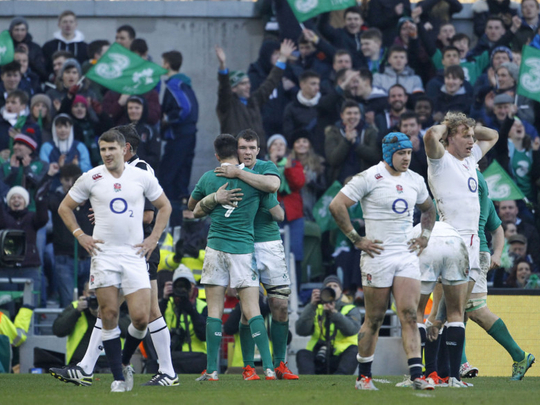
Dublin: Ireland coach Joe Schmidt proclaimed himself really proud of the Irish players for a sterling defensive effort in the final quarter of the Six Nations defending champions’ 19-9 win over England on Sunday at Lansdowne Road.
The victory equalled the hosts’ national record of successive test wins at 10, while also keeping their hopes alive of only the country’s third Grand Slam, as well as being just the second time to retain the title (1948/49).
However, they were at times hanging on by their fingertips as England — who came into the game also with two wins from two matches — mounted wave after wave of attacks as they clawed their way back from 19-3 down.
“With the quality of the England ball carriers and their fleet-footed backs, I thought the fact we kept them off the try line as they came at us in swarms was outstanding,” said Schmidt.
“We showed character and I am really proud of the players.”
For Ireland’s legendary captain Paul O’Connell, who should win his 100th cap for the national side against Wales in a fortnight, it was a victory that ranked up along other memorable ones he has experienced.
“It is a day to enjoy,” said the 35-year-old lock. “We built it up as a big game and this win is right up there as one of the best.
“To go out and execute like we did gave us a great feeling. I never imagined I would look up and see a scoreline at one point of 19-3.”
Schmidt, who has won 13 of the 16 tests he has been in charge of, praised the backline and especially 21-year-old centre Robbie Henshaw, who scored the only try of the encounter when he outjumped Alex Goode in the corner to collect Conor Murray’s deft box kick.
“I thought he [Henshaw] was going to score one in the first half, when Tommy O’Donnell offloaded to him,” said Schmidt.
“However, the move he came up with, with Conor Murray for the try, was absolutely outstanding.”
O’Connell said the thought of equalling the record amount of consecutive test wins hadn’t really occurred to him or his teammates.
“However, what it does give is a certain amount of confidence,” said O’Connell.
“We’ve been holding on better to leads at the end of matches, although it would probably be better if we were finishing with the ball in our hands and not the opponents’.
“What we are certainly doing is improving things match by match and that comes with confidence.”
England coach Stuart Lancaster, whose side had come into the game on the back of four successive victories, praised Ireland’s managing of the game and blamed a lack of discipline largely for the defeat.
“The late surge showed what we can do but in the first half we struggled,” said Lancaster, who has also restored England’s image after a poor 2011 World Cup under Martin Johnson.
“Their try was a key moment, as was when we lost a line-out in the first period having kicked to touch instead of for goal.
“We knew this was going to be a potential banana skin as it is a very difficult place to come and win,” added Lancaster, who experienced his first defeat against the Irish.
Lancaster, like Schmidt a former schoolteacher, said he believed things were beginning to go his side’s way until Henshaw and Murray’s masterstroke.
“Ireland play a smart game,” said the 45-year-old. “There are different ways to skin a cat in winning a test match.”
O’Connell refused to say whether this was his last Six Nations home match before he finally hangs up his boots, although he gave some ground when pressed.
“Yes I can say that it is definitely my last home Six Nations match against England,” said a grinning O’Connell.
“With regard to my moment to retire fully, I will make up my mind soon but I am just focused on arriving at the World Cup in the best possible shape.”








